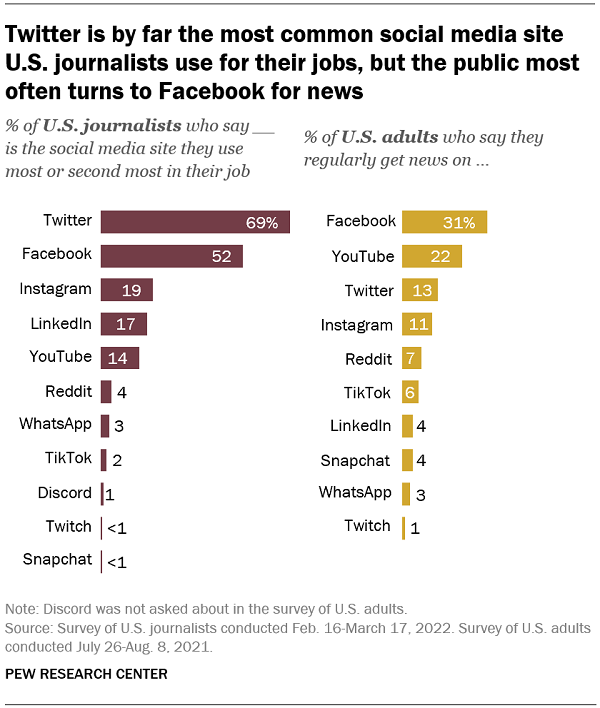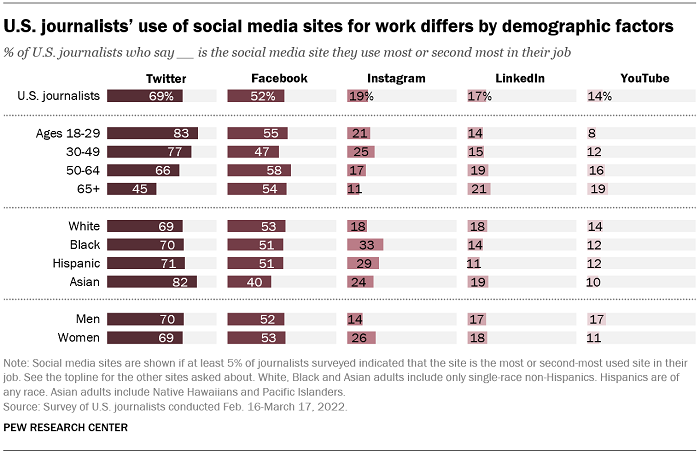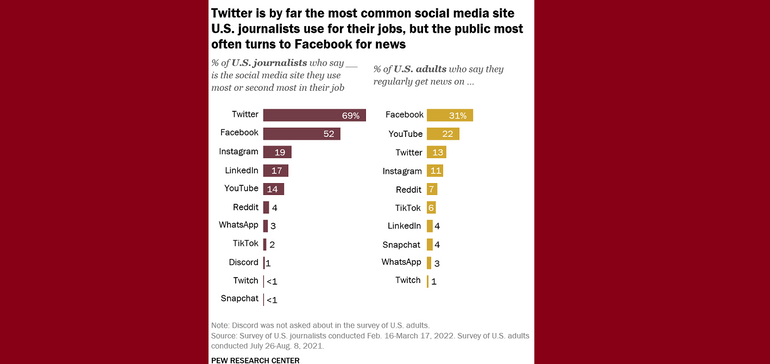If you were looking to get some understanding as to why Twitter is so influential – despite having only around an eighth of the amount of active users that Facebook does – then this may well be the key point.
According to a new Pew Research study, incorporating responses from over 11,500 journalists based in the US, Twitter is by far the most used social platform among this group, which means that much of the reporting that you’re then seeing in media outlets is, at least in some way, being influenced by tweeted opinion.

As per Pew:
“Among journalists, Twitter clearly ranks at the top of the list for work-related tasks. Around seven-in-ten U.S. journalists (69%) say it is the social media site they use most or second most for their job. Twitter is followed by Facebook at 52% and, far lower on the list, by Instagram (19%), LinkedIn (17%) and YouTube (14%). None of the other sites asked about in the survey – Reddit, WhatsApp, TikTok, Discord, Twitch and Snapchat – were named by more than 4% of the journalists surveyed.”
So while Twitter may not have the reach, or see the usage of these bigger platforms, it is used by those who are communicating the latest news of the day, often through these other sites – which means that, one way or another, those who are prominent on Twitter are having an outsized influence on the broader news cycle, which is why Twitter is so important for maximizing key messages and connecting with influential voices.
If you want to influence opinions, it’s often Twitter where this stems from. Sure, Twitter only has 229 million daily active users, but it’s less about the raw numbers here and more about who these people are.
The real-time nature of the tweet feed makes it the perfect place to stay up to date with the latest news as it happens, which is attractive to those who are the most engaged in their respective fields. These prominent, highly active influencers are often the ones ‘breaking’ news to their own communities and networks off-platform, but it’s Twitter where this info originates from, which underlines the importance of connecting with these aggregators at the source.
We’ve witnessed this directly, with former US President Donald Trump essentially conducting policy decisions via tweet. Even during this period, Twitter didn’t see a huge jump in active users, but Trump’s every post was dissected, broken down and reported en masse, by the flurry of journalists who increasingly rely on the platform to stay in touch with the latest.
Connecting with these influential voices can play a key role in your communications strategy, even if you don’t think Twitter, in a direct sense, is worth the effort to reach your target audience.
As you can also see in the above chart, general public response indicates that Facebook remains the most widely used social media site for news overall in the US, with 31% of US adults saying that they log into the platform regularly for new content. YouTube is the second-most frequently used site, with 22% of the public regularly getting news there.
Pew’s data also shows that Twitter is a particular favorite among the youngest journalists, with 83% of those aged 18 to 29 indicating that it’s their most commonly used social media site.
“In stark contrast, 45% of journalists 65 and older identify Twitter as one of their top two social media sites for work tasks. Instagram is also more popular among younger journalists (those under 50), while LinkedIn and YouTube are somewhat more popular among older journalists (those ages 50 and older).”

In other words, Twitter’s influence is likely growing in this respect.
There’s also this:
“Journalists who say they work at an outlet whose audience leans right politically are much more likely than those with left-leaning audiences to say Facebook is one of their top two social media sites for their work (67% vs. 45%). Conversely, journalists who say their organization has a left-leaning audience are twice as likely as those who say their organization has a right-leaning audience to use Instagram (24% vs. 12%).”
Make of that what you will.
The bottom line here is that Twitter is a hugely influential platform, whether you personally use it or not, and in this sense, the raw user data doesn’t tell the full tale of exactly how much tweets can influence public opinion, and bring awareness to key topics.
Maybe that’s why Elon Musk is so keen to purchase it, as a means to more directly influence media narratives – and maybe that’s what Musk means when he says things like he wants the platform to ‘further civilization and consciousness’.



